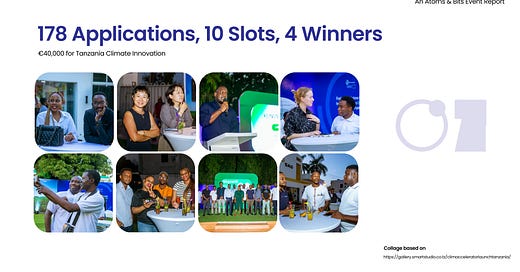Smart Lab has selected 10 startups from 178 applications for its sector-focused accelerator program, offering up to TZS 100 million in total grants.
The announcement came during a launch event held at Smart Africa Group (SAG) headquarters in Dar es Salaam on Thursday evening.
Selected startups include Tanzania Viable Farms from Arusha, Kilimomax from Dodoma, and Ndugunamiti from Mwanza, alongside seven others from across the country. They will go through a 3-month training program starting January 13, 2025, with four winners set to receive €10,000 each after a demo day in April.
This is the second cohort of ClimAccelerator in Tanzania.
It follows a previous group announced in March 2024 that included companies like Africa Harvest, which turns coconut husks into fertilizer, and EcoMilk, which develops solar-powered milking machines.
“Tanzania needs at least US$7 billion for annual climate finance, but currently there is a huge gap between what investors want and what exists in our market," said Larry Ayo, Business Director at Smart Lab, during the launch. He noted that while Tanzania's startup numbers grew from 247 to 842 between 2020 and 2023, only 23% reach growth stage.
The three-month program will focus on building both business skills and climate knowledge.
"Each startup will get training on how climate change affects their work, and how to measure their impact on communities," said Laurian Mafuru from Smart Lab, who detailed the program structure at Thursday's launch.
The Lab has designed ClimAccelerator in stages. First, startups will go through background checks in December to assess their current stage. Then from January to March, they'll receive training, mentorship, and help preparing investor documents.
The program ends with a demo day in April 2025, where four winners will be chosen for the €10,000 milestone-based grants per finalist.
"We'll map out exactly what they're going to do with the funding, within specific areas, to ensure they're using it effectively," Laurian explained. After the demo day, winners will get two months to test their solutions in rural communities, with Smart Lab's team making site visits to help measure impact.
Gerald David, Innovation Lead at The Global Resilience Partnership, highlighted why this focus on smaller funding amounts matters:
"We learned from past programs that started with $250,000 minimum investments. When we reduced the ticket size to $50,000 in 2017, applications jumped from 1,000 to 5,000. Most early-stage climate solutions in Tanzania need smaller amounts to prove their ideas work.”
The ten selected startups span different areas of climate adaptation.
They place a heavy emphasis on agricultural innovation. Viable Farms specializes in the primary production of high-quality potato seeds, sweet potatoes, and beans.
Kilimomax trains farmers to increase their productivity and sustainability, while Ndugunamiti focuses on landscape restoration, tree planting, and sustainable timber processing.
Other selected companies include Kesho Technologies, which uses artificial intelligence for early warning systems to help farmers prepare for weather changes, and Thornstone, which provides insurance solutions for farmers, fishers, and livestock keepers facing climate-related disasters.
Rada 360 and Addrone Digital both work on precision farming. They use unmanned aerial vehicles (UAVs) to create digital soil maps and collect other useful agricultural data.
The selection is in line ClimAccelerator's global focus areas of land use, circular economy, and adaptation technologies.
This Tanzania program specifically targets rural communities, where climate impacts are most severe.
"These founders are not only building businesses but also developing solutions for farmers and rural communities who face the biggest climate risks," Larry Ayo noted during the ClimAccelerator second cohort launch event.
That local focus aligns with Climate-KIC's mission across Africa. The organization has supported over 6,000 startups globally through its accelerator programs, with increasing attention on climate adaptation in regions most affected by climate change.
And, did you know?
The program brings together several organizations to support climate innovation in Tanzania. EIT Climate-KIC, as Europe's largest climate innovation initiative, provides the accelerator framework and funding through its partnership with Irish Aid.
Smart Lab, a subsidiary of SAG, runs the local implementation, building on their six years of experience supporting Tanzanian startups.
"We're combining Smart Lab's local knowledge and network with Climate-KIC's global expertise," clarified Larry Ayo on December 12.
The program has assembled local business leaders and international experts as mentors, including Tian Zhan from UNCDF, who also runs a sector-focused (fintech) accelerator program in Tanzania.
This structure addresses a key gap in Tanzania's climate finance scene.
According to a new report by FSD Africa and Climate-KIC, while private equity and venture capital represent just 1% of climate finance in Tanzania, the number of climate-focused investments has tripled since 2019.
Agriculture and energy sectors dominate these investments, with agriculture representing over half of deal volumes.
Guest of Honor Gerald emphasized why intervention matters:
"Below US$500,000, where the majority of startups and early-stage businesses operate, climate financing is actually not there. We need to focus on the early stages to create a pipeline of investable businesses.”
ClimAccelerator Tanzania 2.0 kicks off on January 13, 2025, after initial background assessments in December.
Over three months, selected startups will receive business training, climate-focused mentorship, and investment preparation support, culminating in a demo day on April 3.
"During these three months, startups will learn to understand their climate impact through Climate-KIC's assessment tools, while building their business skills," Laurian explained on Thursday. Each startup will also develop a comprehensive pitch book containing documentation needed by potential investors.
"When they finish this program in March, these startups won't be the same," Laurian noted. "We're going to work hand-in-hand with them, visiting communities and understanding the real pain points to ensure their products succeed."
Founders of the ten selected companies join a growing network of over 300 Tanzanian innovators supported by Climate-KIC since 2019 through various programs.



